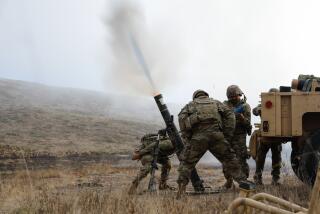Visiting Congressional Panel Hears Pleas to Keep Bases Open
CORONADO â Aboard four Huey helicopter gunships, five congressmen arrived at North Island Naval Air Station here Thursday on a mission to search out maintenance problems that the military says it lacks the money to fix.
But once on the ground, the congressmen were asked not just about finding money for the nationâs military bases, but also about the Bush administrationâs desire to close perhaps 25% of them.
Nowhere does the fear of base closures run deeper than in San Diego County, home to the nationâs largest complex of military installations, providing $10 billion annually to the local economy and employing 103,000 uniformed personnel and 30,000 civilians.
With that in mind, first-term Rep. Susan Davis (D-San Diego) was at the tarmac to meet her touring colleagues from the House Armed Services Committeeâs subcommittee on readiness.
âIn San Diego, we protect the Pacific Rim,â Davis said. âWe need all the military operations we have here. Possibly there could be small changes but weâre very tight already, very economical.â
Although another round of closures is not assured, local officials and California are preparing for the battle ahead.
Of the 98 bases closed in the 1990s, 29 were in California, including the Naval Training Center and the âTop Gunâ-famous Miramar Naval Air Station, both in San Diego.
âThe feeling in this region is that we have to prepare for the unexpected,â said Mitch Mitchell, vice president for public policy with the San Diego Regional Chamber of Commerce. âWe believe if we wait to get ready, there could be a disaster and we could wake up without one of our bases.â
In Sacramento, the California Defense Retention and Conversion Council is accepting grant applications from communities eager to hire economic consultants and lawyers to make the case that their base is essential both to national security and the local economy.
The council was created by the Legislature in 1999 to avoid a repeat of what many legislators believed was an unfair targeting of California during base closure decisions.
âWeâre preparing for a political fight so that California is not used again as an easy target by Washington politicians to strengthen the bases in their districts,â said council member Vince Hall, a consultant to a Sacramento-based technology firm and former staff director for Gov. Gray Davis.
Although California is no longer the military mecca it once was, there are still Air Force bases in Sacramento and Los Angeles, Army bases in the high desert and Navy installations throughout the state.
Ventura County politicians are lobbying aggressively to protect bases at Point Mugu and Port Hueneme. Earlier efforts helped Point Mugu stay open in 1995, when it was on a tentative closure list.
âWe want to be as prepared as we can,â said county Supervisor Frank Schillo, co-chairman of the local Regional Defense Partnership.
Not everyone is fearful of base closures. In Orange County, where two Marine Corps bases were closed, supporters of building a civilian airport at the closed El Toro base believe more closures would lead to a quicker turnover of the 4,700-acre site to the county.
Led by subcommittee Chairman Rep. Curt Weldon (R-Pa.), the delegation was on the third day of a four-day visit to 21 military bases in 12 states.
Weldon organized the trip to gather information on what he called the âcrisisâ afflicting military maintenance.
Among the problems found at numerous bases were substandard housing for enlisted personnel, potholes on runways, and leaky World War II-era warehouses meant to shelter hundreds of millions of dollars in space-age equipment. At North Island, where the Navy does 40% of its air crew training, the unfunded backlog of maintenance needs is $225 million and growing.
Still, Weldon said that at nearly each base the delegation visited, local officials and reporters wanted to talk about base closures.
Weldon and others said they are not convinced that another round of closures is warranted or that the process of converting military bases to civilian uses has been a success.
âI donât think the House Armed Services Committee members have the stomach for more closures, not after all weâve been through in recent years [with base closures] and with what weâve seen as weâve toured bases these past few days,â said Rep. Edward Schrock (R-Va.).
With talk of base closures in the air, the services are not being shy about explaining to the public and the politicians the importance of their installations.
As the helicopters ferried the delegation from Camp Pendleton to North Island, the congressmen were briefed by Marines on why the Marine Recruit Depot in San Diego should not be relocated to Camp Pendleton, an idea long floated to cut the budget.
When the helicopters were late arriving at North Island, a joke ran through the assemblage of reporters and Navy officials that the Marines were taking full advantage of a captive audience of VIPs.
âI think they made an excellent case,â said Rep. Silvestre Reyes (D-Texas) of the Marinesâ view about not relocating the recruit depot. âOne of the ironies of being at peace is that people take defense for granted and forget that training is important and costs money.â
*
Times staff writers Jean Pasco and Matt Surman contributed to this report.
More to Read
Get the L.A. Times Politics newsletter
Deeply reported insights into legislation, politics and policy from Sacramento, Washington and beyond. In your inbox three times per week.
You may occasionally receive promotional content from the Los Angeles Times.










